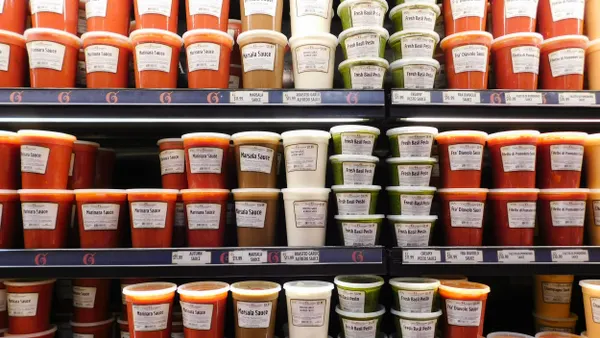Dive Brief:
- Discount retailers, led by dollar stores and Aldi, will account for more than half of retail store openings this year, according to data from Coresight Research cited by CBS News. Out of the almost 2,780 new locations slated for 2019, about 1,800 belong to discount chains.
- Dollar General leads growth by a wide margin, with 975 openings planned in 2019, followed by Dollar Tree, which is planning 350 new stores, then Family Dollar, Aldi and Five Below, according to the report.
- Discount retailers are gaining the most traction in rural areas where there are fewer store options and where larger retailers like Amazon have been less successful compared to metropolitan centers.
Dive Insight:
The fact that discounters are resonating in a strong economy shows just how much shoppers value a bargain. It's also testament to the broadening appeal these stores have, with fresher, higher-quality assortment and updated store layouts reaching consumers higher up the income ladder.
Aldi, which is slated to open around 160 new locations this year, per Coresight, has transformed its no-frills legacy stores into mini supermarkets with an array of fresh and unique store brands. The discounter just opened its 1,900th store location in the U.S., a 12,000-square-foot space in San Diego's Mira Mesa neighborhood.
Dollar General has brought more food and beverage products into its aisles, including perishable assortments and store brand items. Hundreds of stores now carry produce, and the company has begun self-distributing fruits and vegetables as it seeks to keep prices down. A recent study from the University of Nevada, Las Vegas found the quality of fruits and vegetables at the dollar stores is just as good as regular grocery store produce.
Dollar Tree, meanwhile, plans to install more freezers in its stores and begin selling alcohol at 1,000 of its Family Dollar locations.
Adding further fuel to discounters' store push is the fact that they perform well in a down economy and are able to push into low-income neighborhoods where traditional chains can't venture. As these chains expand and evolve, they're forcing conventional retailers to slash prices, run more promotions and spend more money on their own store updates. Even Walmart is having a tough time maintaining its low-price edge against these competitors. In a pointed challenge, last October Aldi opened a store less than a mile from Walmart's corporate headquarters.
Grocery chains are hoping their prepared meals, private labels and wide assortment can offer a compelling alternative to discount chains. But with all their recent investments, Aldi, Dollar General and company are heading these traditional competitors off at every turn. Increasingly, consumers are showing a preference for a scaled-down shopping experience that offers limited assortment and the ability to make quick trips.
In a further sign of discount retailing's ascension, Grocery Outlet has officially launched its initial public offering, with shares anticipated in the $15 to $17 range.
The competition among discount stores is mounting, though, and not every retailer is seeing strong growth. Save-A-Lot, the second largest hard discounter in the U.S. behind Aldi, is considering a sale or possibly taking on an investor as competition and a large debt load slow the business down. Dollar Tree's closures are on track to eclipse its openings, with 390 Family Dollar stores set to shutter this year after it closed 84 store locations in the fourth quarter of 2018.
Store closures are the prevailing trend across retail in general, according to Coresight, which recently stated as many as 12,000 locations across the country could close their doors this year.















